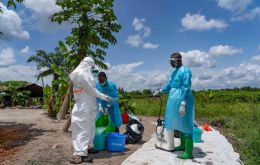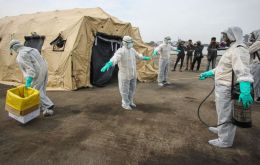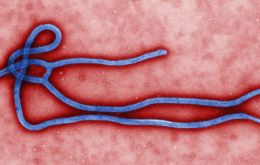MercoPress. South Atlantic News Agency
Tag: ebola
-
Monday, May 2nd 2022 - 21:35 UTC
WHO concerned over resurgence of Ebola

The World Health Organization (WHO) has voiced its concern over the reappearance and subsequent spread of Ebola in the Democratic Republic of Congo, a territory formerly known as Zaire.
-
Tuesday, July 23rd 2019 - 09:12 UTC
Ebola experimental vaccines trigger cabinet dispute in Congo

Congo's health minister, Oly Ilunga, resigned on Monday in protest at the presidency's announcement last week that it was stripping his team of control over the response to the Ebola outbreak.
-
Friday, May 18th 2018 - 08:42 UTC
Ebola outbreak in Congo's jungle and in urban area of a 1.2m city

One new case of Ebola virus disease (EVD) has been confirmed in Wangata, one of the three health zones of Mbandaka, a city of nearly 1.2 million people in Equateur Province in northwestern Democratic Republic of the Congo. United Nations troops are stationed in the area as part of the peacekeeping effort.
-
Monday, October 13th 2014 - 00:26 UTC
Ebola's exponential growth

By Gwynne Dyer - Here are two good things about the Ebola virus. It is unlikely to mutate into a version that can spread through the air, as some other viruses have done. And people who have been infected by Ebola cannot pass it on to others during the incubation period (between two and 21 days). Only when they develop detectable symptoms, notably fever, do they become infectious to others, and only by the transfer of bodily fluids.
-
Friday, September 12th 2014 - 01:18 UTC
Congo reports 31 new Ebola cases in the week to 9 September

Thirty one cases of Ebola virus disease (EVD) more have been reported between 2 and 9 September 2014, in the Democratic Republic of the Congo (DRC), increasing the cumulative number of cases to 62 (14 confirmed, 26 probable, and 22 probable), according to the latest report from WHO, World Health Organization.
-
Tuesday, September 2nd 2014 - 22:49 UTC
Ebola outbreak in Congo is the indigenous 'Zaire strain' and not connected to West Africa

Results from virus sequencing of samples from the Ebola outbreak in the Democratic Republic of Congo (DRC) have been analyzed and they belong to the so called Zaire strain, in a lineage most closely related to a virus from the 1995 Ebola outbreak in Kikwit, DRC.
-
Friday, August 22nd 2014 - 13:19 UTC
Two first patients treated for Ebola virus in US hospital have been released

The two United States aid workers who were the first patients ever to be treated for the Ebola virus at a hospital in the US have been released, capping a transcontinental medical drama that stirred public debate about whether citizens with the virus or exposed to the virus should have been allowed to return.
-
Saturday, August 16th 2014 - 08:28 UTC
Ebola-affected region athletes involved in body contact disciplines banned from Youth Games

The International Olympic Committee (IOC) announced on Friday it was prohibiting young athletes from the Ebola-affected region of West Africa from participating in certain events at the Youth Olympic Games in Nanjing, China.
-
Wednesday, August 13th 2014 - 06:29 UTC
First European Ebola infected dies; WHO approves unproven drugs for people at risk

Spanish priest Miguel Pajares, 75, the first European infected by a strain of Ebola that has killed more than 1,000 people in West Africa, has died in hospital in Madrid, a spokeswoman for the city's health authorities said.
-
Saturday, August 9th 2014 - 06:38 UTC
Ebola outbreak becomes a “public health emergency of international concern”

World Health Organization declared on Friday that the Ebola outbreak spreading across West Africa has become a “public health emergency of international concern”. WHO also revealed that Ebola took an additional 29 lives between Tuesday and Wednesday alone.
